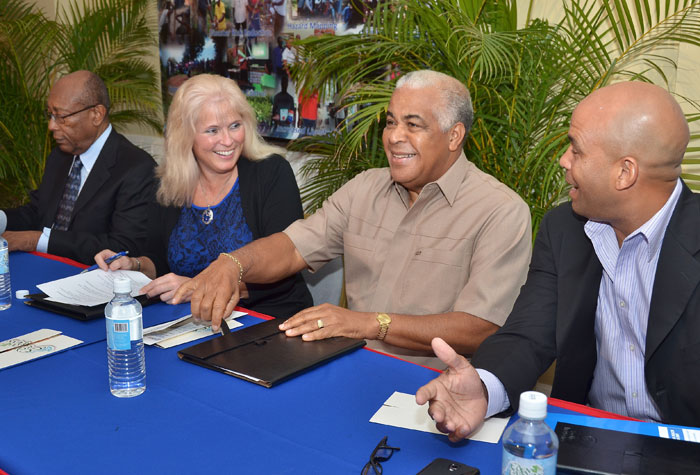Cedar Valley Residents Benefit From Climate Change Project
By: , January 23, 2014The Key Point:
The Facts
- The project commenced in 2011 and benefited more than 500 residents, most of which were farmers.
- The residents of Cedar Valley have been given the necessary knowledge to manage the risks associated with climate change, while improving their lives.
The Full Story
Residents of Cedar Valley in St. Thomas have been equipped with the techniques and tools to better enable them to secure their properties and livelihoods against natural disasters.
This was through the Climate Change Adaptation and Disaster Risk Management project, funded by the United States Agency for International Development (USAID) with cost-share contributions from the Environmental Health Foundation (EHF). The project commenced in 2011 and benefited more than 500 residents, most of which were farmers.
It was geared at building the community’s resilience to climate change, to which it is particularly susceptible, while improving the management of land and other natural resources.
Speaking at the close-out ceremony for the project held on January 23, at the Eden Gardens in St. Andrew, Minister of Water, Land, Environment and Climate Change, Hon. Robert Pickersgill, said that the residents of Cedar Valley have been given the necessary knowledge to manage the risks associated with climate change, while improving their lives.
Highlighting the wide cross-section of participants, he expressed pleasure that among the groups targeted were young people and women.
“Women’s traditional roles as the main users and managers of natural resources, as well as the primary caregivers, and labourers, mean they are involved in, and are dependent on livelihoods and resources that are most at-risk from climate change,” he said.
Mr. Pickersgill commended the organisers for the numerous projects undertaken as part of the initiative, particularly the rainwater harvesting and water conservation aspects.
“I also want to commend them on their efforts at building resilience, in particular, conducting a hazard mapping and vulnerability assessment of the Cedar Valley community; implementing disaster-risk reduction strategies; as well as conducting workshops to educate and inform the citizens,” he stated.
Mr. Pickersgill gave the Government’s commitment to the process of climate adaptation and mitigation, working with all partners and stakeholders “in ensuring that Jamaica is not left behind”.
He pointed out that climate change threatens food security including the availability of food due to loss in production; access to food through infrastructure damage and asset losses; and the loss of income and employment for some 20 per cent of the labour force, which is currently involved in agriculture and fisheries.
In her remarks, Akilah Campbell, who spoke on behalf of the residents, said the project positively impacted the lives of the community members.
Some of the achievements under the project include: distribution of 165 black tanks for rainwater harvesting; completion of hazard mapping and vulnerability assessment of the community; development of disaster risk reduction strategies; and identification of 17 acres of denuded land for replanting.
In addition, there was the establishment of five hectares of cash crops; training of farmers in sustainable agricultural techniques (contouring, application of fertilizer, seed germination, among others), rainwater harvesting, irrigation, and slope stabilisation.
The partner organisations included: Rural Agricultural Development Authority (RADA); St. Thomas Parish Council; Planning Institute of Jamaica (PIOJ); Office of Disaster Preparedness and Emergency Management (ODPEM); Meteorological Service; National Environment and Planning Agency (NEPA); University of the West Indies (UWI); St. Thomas Environmental Protection Association (STEPA); Forestry Department; and the Social Development Commission (SDC).

